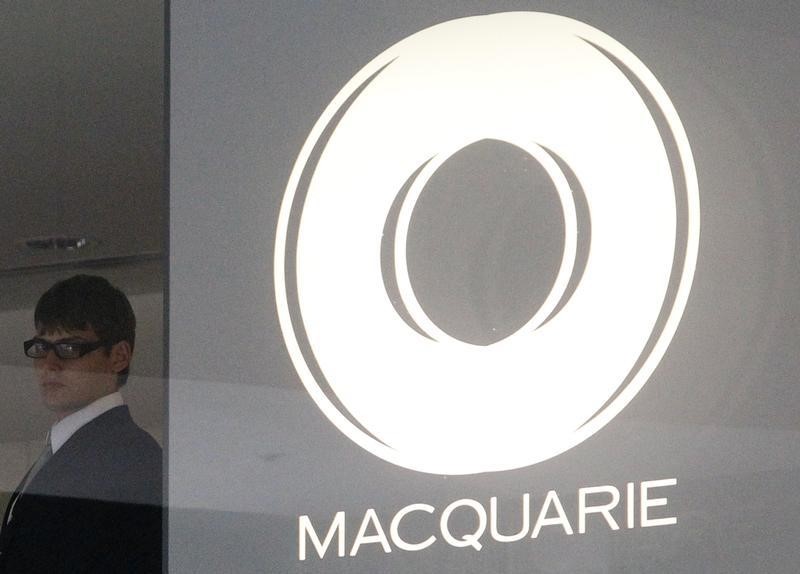By Jonathan Schwarzberg and Leela Parker
NEW YORK, April 8 (Reuters) - Macquarie Group made its debut as the top bookrunner of loans backing U.S. private equity buyouts in the first quarter league tables, as banks that traditionally dominate the league tables and non-banks such as Jefferies, fell back as intense market volatility and regulation designed to curb risky lending continues to reshape the market.
Macquarie topped the U.S. buyout bookrunner quarterly league table for the first time, up from 12th position in 2015, in a quiet first quarter, as lenders focused on selling deals that were stuck in the market late last year rather than underwriting new loans.
"Our market presence continues to increase and we expect to be in our fair share of deals going forward. We continue to be very selective," said Michael Silverton, head of Macquarie Capital for the United States and Latin America.
Commercial banks with big balance sheets generally fared better and took market share in 2016 from investment banks and non-banks such as Jefferies, which are not fettered by regulators' Leveraged Lending Guidance that was designed to limit lending for highly leveraged deals.
Jefferies tumbled to 19th place in the first quarter from second place in 2015. The firm topped the buyout league tables in the second quarter of 2015, but fell to eighth place in the fourth quarter as it struggled to sell hung deals, along with other arranging banks, including a $1.5 billion loan backing department store BELK's buyout.
Banks with big balance sheets were better able to weather global market volatility in late 2015 as investors retreated from risk amid concerns about the effects of oil prices and China's economic slowdown.
Citigroup (NYSE:C), Goldman Sachs (NYSE:GS) and Barclays (LON:BARC) took second, third and fourth places, respectively, in the first quarter. Barclays was the top buyout loan arranger in 2015. Morgan Stanley (NYSE:MS) was in fifth place in the first quarter, despite being caught on several hung deals including Veritas.
Leveraged loan specialists Credit Suisse (SIX:CSGN), Deutsche Bank (DE:DBKGn) and RBC fell out of the top five in the first quarter. Deutsche Bank plummeted to 22nd place, RBC was down to 12th position and Credit Suisse sank to eighth.
Credit Suisse was also hampered by several deals that the bank was forced to sell at steep discounts including a $635 million term loan B and a $275 million term loan A backing drug company Lannett's acquisition of Kremers Urban Pharmaceuticals in November, that it underwrote with RBC and sold with discounts of 90 and 92.5, respectively. SLOW FIRST QUARTER
Middle market specialist Macquarie is not subject to the leveraged lending guidelines and was able to profit from the disruption at the top end of the market as buyout lending fell 29 percent from the fourth quarter to $112 billion and arrangers struggled to syndicate large LBO loans.
The firm is a relative newcomer to leveraged lending and has rapidly built a position as a strong midcap lender. Macquarie also managed to pass on some of the painful deals that constrained arranging banks' balance sheets including Kraton Polymers' acquisition of Arizona Chemicals.
"We started building out our leveraged finance business six years ago from scratch, and it took us some time to build the relationships," Silverton said. "In addition to our core advisory expertise, we have been working with clients across DCM, ECM and our principal transactions team, which has helped to solidify these relationships."
While Macquarie was not the top 'lead left' bank on any large first quarter deals, it consistently took lead arranger positions on buyout financings for retailer Petco Animal Supplies, technology companies SolarWinds and Solera, and healthcare analytics provider MedAssets, which allowed it to gain market share.
"Macquarie has undoubtedly been taking advantage of the whole leverage lending guidance/regulated bank dynamic to seize their position and put their balance sheet to work without leading deals," said a lawyer who focuses on leveraged buyouts.
Jefferies was an underwriter on the hung deals for Veritas and BELK, which was sold at a discount of 89, as well as an $820 million loan backing the buyout of clothing company FULLBEAUTY, which was sold at a discount of 93. The firm posted a loss of $167 million in its first fiscal quarter 2016, which ended February 29.
"New issue equity and leveraged finance capital markets were virtually closed throughout January and February, which resulted in many of our potential Investment Banking capital markets transactions being postponed until some stability returns to markets." said Jefferies Chairman and Chief Executive Officer Richard Handler in the Jefferies first quarter earnings report on March 15.
The firm also said in the earnings report that it marked two loans down by $38 million in the first quarter that were closed by Jefferies Finance.
Despite taking some hits, Jefferies is still doing deals and is looking to bounce back in 2016 and said that the U.S. leveraged loan market is showing signs of strength again.
"After a slow start to the year, leveraged finance activity is picking up and Jefferies is broadly active with our clients, including leading Surgery Partners' $400 million senior unsecured notes offering which we completed last week," Jim Walsh, global head of leveraged finance at Jefferies, said.
